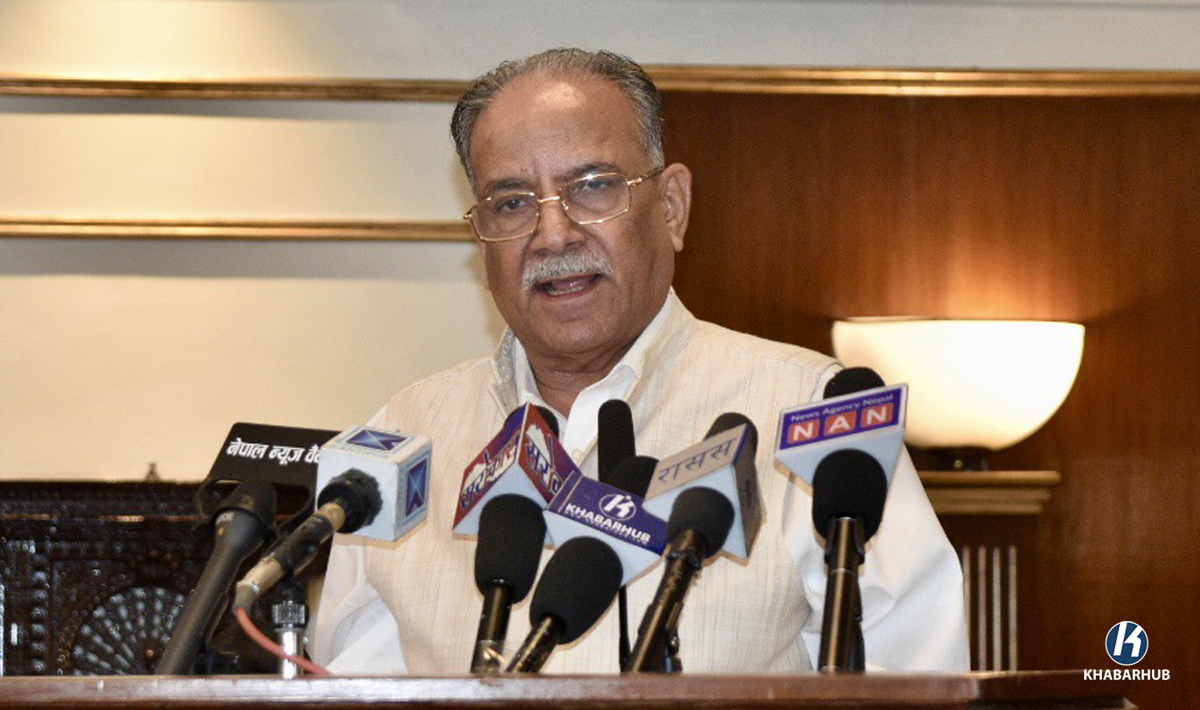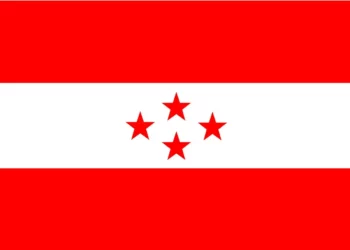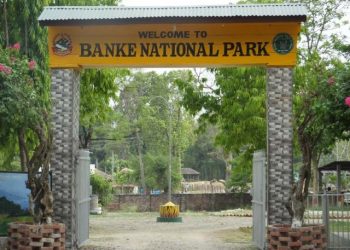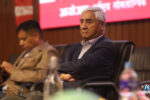KATHMANDU: Chair of the CPN Maoist Center, Pushpa Kamal Dahal ‘Prachanda’, has accused the Nepali Congress and CPN-UML of using the issue of constitutional amendment as a tactic to change the government rather than a genuine agenda for reform.
He made these remarks during a discussion program on ‘Constitutional Implementation: Expectations and Reality,’ jointly organized by the Constitution Watch Group and the Institute for Strategic and Socio-Economic Science Research (ISSR) in Kathmandu on Monday.
“They had not formally discussed the need for constitutional amendment until two-four days before forming the new alliance,” said former Prime Minister Prachanda, “It is clear that the government has used this as a political tool to change the government.”
Prachanda said that since the current constitution is part of the peace agreement, there is no political meaning in agreeing to amend the constitution by hiding it from the parties and leaders who signed the peace agreement.
“The leaders of Congress and UML secretly made agreements even with their own parties. The public was also kept in the dark,” Prachanda commented, “When the people began to challenge them to show the seven-point agreement, the Prime Minister read it out in Parliament. However, it remains unclear whether it is genuine or fake, as the signatures have yet to be displayed.”
Reminding that he did not get the support of major parties to make the necessary laws for the implementation of the constitution and federalism, Prachanda said that it took 18 months to bring the federal civil service law to the parliament. Even after it was introduced, there was no willingness to pass it. And even when Police Personnel Adjustment Act was passed, there was reluctance to implement the Police Personnel Adjustment Act.
Prachanda, as the Chair of the Maoist Center, stressed that he took risks both internally and externally while drafting the Constitution.
“Some of our own friends left the party, claiming that a revolutionary Constitution would never be made. However, as a signatory to the peace agreement, I could not simply walk away,” he said., “Despite taking significant risks, I was determined to see the peace process and constitution-making through to completion.”
During the interaction, Nepali Congress leader NP Saud stressed the importance of understanding the distribution of political power during constitutional amendments.
“We are moving forward recognizing that the Constitution is a changing document,” said leader NP Saud. “It is crucial to understand how political power has been distributed. We need to examine how we have divided political power at the federal, provincial, and local levels, and whether this distribution has enabled those government bodies and structures to function effectively.”
Meanwhile, CPN-UML leader Surendra Pandey emphasized the need to reach consensus on both the process and issues of constitutional amendments.
“We do not consider the Constitution as unchangeable. Let’s identify where changes are needed,” he said, “We should agree on the process for constitutional amendment as well as the issues that need to be addressed.”
UML leader Pandey also urged to recall the situation in which the constitution was not promulgated by the Second Constituent Assembly.
“Wasn’t it created amidst conflict? Wasn’t it passed despite some boycotting? Are we so unaware?” he questioned. “There may be errors or weaknesses, but the country needed a Constitution. The Assembly was dissolved twice; if we hadn’t acted, we wouldn’t have a Constitution at all. This Constitution has already been amended twice.”
Santosh Pariyar, Chief Whip of the Rashtriya Swatantra Party (RSP), stated that there is no reason to fear constitutional amendments. He criticized Congress and UML for claiming that the proportional electoral system has led to instability, calling it a white lie.
Pariyar noted that while the government has raised the issue of constitutional amendment, doubts about their intentions remain. He urged Maoist Chair Prachanda to lead efforts for amendments favoring Dalits, women, Madhesh, and identity groups.
“Under your leadership, we had the best Constitution; lead again to create one that supports Dalits, women, Madhesh, and identity,” he said.
Rabindra Mishra, Senior Vice-chair of the Rashtriya Prajatantra Party (RPP), referred to the Constitution of Nepal 2072 as ‘Prachanda’s Constitution.’
“I call it Prachanda’s Constitution because everything that has happened has been done through it,” he stated. He asserted that the Constitution cannot effectively guide the country if amendments are made only to address minor issues.
“You can patch up one or two holes in your coat, but if it’s torn everywhere, it won’t hold,” he explained, “Similarly, looking to fix only the branches and leaves of the Constitution will not help the country progress in the right direction.”
Likewise, Kalyan Shrestha, Chair of the Constitution Watch Group and former Chief Justice, emphasized that the Constitution must be properly implemented before any revisions are considered.
Naresh Shrestha, the director of the organizer ISSR, gave a welcome speech, while Janamat Party Vice-chair Deepak Shah and former Chief Minister of Madhesh Province Lal Babu Raut also expressed their views on the amendment of the Constitution.









Comment